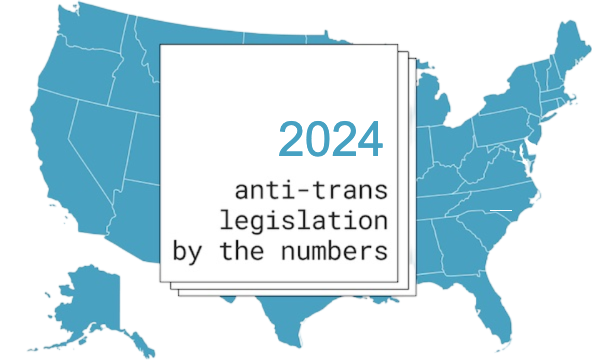2025 anti-trans bills tracker
In 2025, anti-trans bills continue to be introduced across the country. We track legislation that seeks to block trans people from receiving basic healthcare, education, legal recognition, and the right to publicly exist.
953 bills
49 states
120 passed
186 active
647 failed
Click on a state to see bills
Passed anti-trans bills
In 2025, 120 anti-trans bills have passed so far.
National anti-trans bills
We're tracking 75 national bills in the United States in 2025.
In 2024, an unprecedented 88 bills were introduced at the federal level across categories like healthcare, student athletics, the military, incarceration, and education during the previous 118th United States Congress, which ran until January 3, 2025.
What is happening with anti-trans bills in 2025?
In 2025, 953 bills are under consideration across the country that would negatively impact trans and gender non-conforming people. This number is anticipated to grow.
Considered
Passed
2024 was the fifth consecutive record-breaking year for total bills considered. This followed the unprecedented surge in 2023, which more than tripled the record set the year before.
As the targeting of trans people has increasingly moved to the national stage, we've seen this reflected in the number of federal bills. In the span of just two years, we went from tracking zero national bills, up to an unprecedented 88 bills at the federal level in 2024.
Most active states in 2025
In 2025, legislation is being considered across 49 states, as well as nationally. Here's a snapshot of the states with the most anti-trans bills under consideration right now.
| State | Number of Bills |
|---|---|
| Texas | 131 |
| National | 75 |
| Missouri | 67 |
| Iowa | 35 |
What types of bills are you tracking?
Each bill is accompanied by a category label that indicates its primary area of impact. Education and healthcare bills make up about half of all bills considered in 2025.
EDUCATION 262
These bills target educational settings. They aim to deny students name and pronoun autonomy, forcibly out trans students to their parents, and ban basic gender identity education, among other goals.
HEALTHCARE 197
The number of bills seeking to prohibit gender-affirming care — medical care supported by every major medical association — has surged in recent years. Many seek to outlaw care for minors and adults, and others would impact insurance coverage or access to services.
SPORTS 119
Sports bills target athletics in K-12 and higher education. They seek to codify sweeping definitions of gender and sex. Over one third of states have already passed laws banning transgender students from participating in sports consistent with their gender identity.
BATHROOM 55
Nearly a decade after North Carolina's infamous HB2, bathroom bills continue to be proposed. This category captures bills that would restrict access to public facilities.
PERFORMANCE 25
The performance category grew quickly in 2023, targeting gender non-conforming events and the businesses that host them. However, the language of the laws is so broad that it could extend to performances of Shakespeare.
OTHER
foster care 1
child welfare 1
military 3
parental rights 4
child custody 5
employment 5
religious exemptions 6
civil rights 8
adoption 10
pronouns 11
marriage 14
child abuse 20
incarceration 20
birth certificates 22
other 165
Executive Orders
Executive orders are directives from the President, typically guiding federal agencies in their work. They do not change federal laws, alter the Constitution, or override the courts’ role in interpreting laws.
However, executive orders do have significant influence over the internal affairs of government and create both confusion and harm, as we are seeing following the flurry of executive orders in early 2025. Below, find a list of this year's relevant executive orders.
Executive orders can be overturned in several ways: Congress can pass a law reversing them if it has the authority, courts can strike them down if they violate the Constitution or federal law, and future presidents can modify or revoke them with new orders. Below, see a list of relevant executive orders from 2025.
Featured by
Our data has supported news organizations, researchers, policy makers, medical associations, and U.S. government agencies in highlighting the harm of anti-trans legislation.
Read the bills
We invite you to explore the texts of anti-trans bills. Below, you will find excerpts from bills that considered in 2024. Each excerpt links back to the bill listing where you can see the full details and read the complete bill.
Legislative Calendar
Each state has its own legislative calendar. This means that sessions convene and adjourn at different times, depending on the state. The table provides a reference for 2025 state calendars.
| State | Session | Convenes | Adjourns |
|---|---|---|---|
| Alabama | 2025 - 2025 Regular Session | 02/04/2025 | 05/15/2025 |
| Alaska | 2025-2026 - 34th Legislature | 01/21/2025 | 05/20/2026 |
| Arizona | 2025 - 57th Legislature; First Session | 01/13/2025 | 04/26/2025 |
| Arkansas | 2025 - 95th General Assembly; Regular Session | 01/13/2025 | 04/11/2025 |
| California | 2025-2026 | 12/02/2024 | 11/30/2026 |
| California | 2025 Spec Session 1 - X1 | 12/02/2024 | 01/31/2025 |
| Colorado | 2025 - 75th General Assembly; First Session | 01/08/2025 | 05/07/2025 |
| Connecticut | 2025 | 01/08/2025 | 06/04/2025 |
| Delaware | 2025-2026 - 153rd General Assembly | 01/14/2025 | 06/30/2026 |
| District of Columbia | 2025-2026 - 26th Council Period | 01/02/2025 | 12/31/2026 |
| Florida | 2025 - Regular Session | 03/04/2025 | 05/02/2025 |
| Georgia | 2025-2026 - 157th General Assembly | 01/13/2025 | 03/31/2026 |
| Hawaii | 2025 | 01/15/2025 | 05/01/2025 |
| Idaho | 2025 - 67th Legislature; First Regular Session | 01/06/2025 | 03/31/2025 |
| Illinois | 2025-2026 - 104th General Assembly | 01/08/2025 | 12/31/2026 |
| Indiana | 2025 - 124th General Assembly; First Regular Session | 01/06/2025 | 04/29/2025 |
| Iowa | 2025 - 90th General Assembly; First Session | 01/13/2025 | 04/30/2025 |
| Kansas | 2025 - Regular Session | 01/13/2025 | 05/01/2025 |
| Kentucky | 2025 - Regular Session | 01/07/2025 | 04/15/2025 |
| Louisiana | 2025 - Regular Session | 04/14/2025 | 06/10/2025 |
| Maine | 2025-2026 - 132nd Legislature | 12/04/2024 | 06/19/2026 |
| Maryland | 2025 - Regular Session | 01/08/2025 | 04/07/2025 |
| Massachusetts | 2025-2026 - 194th General Court | 01/01/2025 | 12/31/2026 |
| Michigan | 2025-2026 - 102nd Legislature | 01/08/2025 | 12/31/2026 |
| Minnesota | 2025-2026 - 94th Legislature | 01/07/2025 | 12/31/2026 |
| Mississippi | 2025 - Regular Session | 01/07/2025 | 04/07/2025 |
| Missouri | 2025 - 102nd General Assembly; First Regular Session | 01/08/2025 | 05/30/2025 |
| Montana | 2025 - 69th Legislature; Regular Session | 01/06/2025 | 04/27/2025 |
| Nebraska | 2025 - 108th Legislature; First Session | 01/08/2025 | 06/05/2025 |
| Nevada | 2025 - 83rd Regular Session | 02/03/2025 | 06/02/2025 |
| New Hampshire | 2025-2026 - 169th General Court | 01/08/2025 | 12/31/2026 |
| New Jersey | 2025-2026 - 221st Legislature | 01/14/2025 | 12/31/2026 |
| New Mexico | 2025 - 57th Legislature; First Regular Session | 01/21/2025 | 03/22/2025 |
| New York | 2025-2026 - 204th Legislature | 01/08/2025 | 12/31/2026 |
| North Carolina | 2025-2026 - 161st General Assembly | 01/29/2025 | 06/30/2026 |
| North Dakota | 2025 - 69th Legislative Assembly; Regular Session | 01/07/2025 | 04/26/2025 |
| Ohio | 2025-2026 - 135th General Assembly | 01/06/2025 | 12/31/2026 |
| Oklahoma | 2025 - 60th Legislature; First Session | 02/03/2025 | 05/30/2025 |
| Oregon | 2025 - 83rd Legislative Assembly; Regular Session | 02/03/2025 | 06/30/2025 |
| Pennsylvania | 2025-2026 - 209th General Assembly | 01/07/2025 | 12/31/2026 |
| Rhode Island | 2025-2026 - 113th General Assembly | 01/06/2025 | 12/31/2026 |
| South Carolina | 2025 - 126th General Assembly | 01/08/2025 | 06/01/2025 |
| South Dakota | 2025 - 98th Legislative Session | 01/13/2025 | 03/31/2025 |
| Tennessee | 2025 - 113th General Assembly | 01/14/2025 | 04/30/2025 |
| Texas | 2025 - 88th Regular Legislative Session | 01/14/2025 | 05/29/2025 |
| Utah | 2025 - 67th Legislature; General Session | 01/27/2025 | 03/13/2025 |
| Vermont | 2025 - 2025-2026 Biennium | 01/07/2025 | 06/30/2026 |
| Virginia | 2025 - 2025 Regular Session | 01/14/2025 | 03/14/2025 |
| Washington | 2025 - 69th Legislative Session | 01/13/2025 | 04/27/2025 |
| West Virginia | 2025 - 87th Legislature | 01/08/2025 | 04/08/2025 |
| Wisconsin | 2025-2026 - 105th Legislature | 01/06/2025 | 12/31/2026 |
| Wyoming | 2025 - 67th Legislative Session | 01/13/2025 | 03/11/2025 |
History and trends of anti-trans legislation in the U.S.
If you want to learn about the recent history of anti-trans legislation in the United States, start with our overview of anti-trans data. The overview documents the steep rise in bills targeting trans kids and adults.
Our further reading recommendations curate articles exploring the language and arguments employed in these transphobic bills, as well as the organizations promoting anti-trans legislation.
We strive to present the most comprehensive and up-to-date data record of anti-trans legislation in the United States. Trans Legislation Tracker maintains an expanding archive of historical data regarding U.S. anti-trans bills. You can take a deeper dive into recent years through our annual reports featured below.
2024 anti-trans bills recap
This annual review describes the record-breaking year of 2024. We chart the ballooning number of educational, sports, and healthcare bills. We also follow broader efforts to redefine terms that would effectively define trans people out of state law. Finally, we quantify the increases in anti-trans bills on the national stage.
2023 anti-trans bills recap
This annual review describes the doubling down of efforts to limit transgender healthcare for youth and adults in 2023. We chart the ballooning number of bills targeting educational settings (bathrooms, sports, pronoun use, gender identity education, etc.), and the unprecedented wave of national anti-trans bills.
2022 anti-trans bills recap
The 2022 recap highlights the large number of bills seeking to enshrine into state law the definition of "man" and "woman" as being synonymous with a "biological sex" assigned at birth. We look back at Florida's "Don't say gay" bill, Oklahoma's declaration of an emergency in order to prohibit non-binary birth certificates, and the first passage of a law to impose criminal penalties on providers of gender-affirming care.










